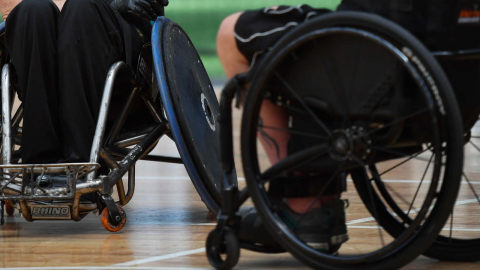
Just one fine has been issued and only one provider banned by the disability watchdog despite more than 8000 complaints being lodged in the past two years.
The scandal-plagued disability sector will get $22 billion from the federal government this financial year, but an independent review found the system left vulnerable people open to harm and neglect.
New figures provided by the National Disability Insurance Scheme Quality and Safeguards Commission reveal the solitary $12,000 fine was handed to now-banned provider Integrity Care after its client Ann Marie Smith died in "appalling circumstances" earlier this year.
The South Australian woman, 54, died on April 6 from severe septic shock, organ failure, severe pressure sores, malnutrition and issues connected with her cerebral palsy.
Her death remains subject to a criminal investigation by South Australia Police, which has resulted in a charge of manslaughter against her former carer.
The figures also reveal that on more than 200 occasions providers failed to notify the watchdog of the death of a person with disability within five days of the fatality.
Labor's NDIS spokesman Bill Shorten said the new data revealed the "shocking secret" about the Morrison government's "much-vaunted" disability watchdog.
"It is simply not doing its job and Australians with disability are dying as a result," Mr Shorten said.
"Only one solitary fine, only one provider banned and only 22 individuals banned in two years despite thousands and thousands of tip-offs."
An independent review into the circumstances into the failings of care for Ms Smith by Alan Robertson SC this month issued 10 recommendations to improve the quality and safeguards for NDIS participants. They included appointing a specific person with overall responsibility for a vulnerable person’s safety and well-being, a ban on sole carers and implementing a community visitor scheme.
The watchdog's own data, provided to Federal Parliament's joint standing committee on the NDIS, shows 22 individual carers were banned between July 1, 2018, and June 30 this year, including 13 in NSW and five in Queensland. Two of those bans were later withdrawn following a "change of information", the commission said.
More than 5700 complaints led to 8168 investigations into alleged abuse and neglect, provider practice and worker conduct, the commission said.
In about 47 per cent of cases there was no further action taken, while in 42 per cent the commission provided "advice and assistance" to the person with disability affected by the issue and the NDIS provider to which the issue related.
In about 11 per cent of cases a resolution process was undertaken, with 85 per cent of those resolved. The remaining 15 per cent were closed for other reasons including the complainant withdrawing the complaint, or the commission initiated compliance action.
About 24 per cent of those cases remain open while 76 per cent have been closed, the figures show.
The $35 million-a-year independent agency, which has more than 300 staff, was established to improve the quality and safety of NDIS supports and services.
It has access to a wide range of compliance and enforcement provisions including seeking injunctions and civil penalties, revoking registration and issuing banning orders on a case-by-case basis.
It chalked up more than $1.5 million in travel costs last year and has an executive team paid more than $2 million.
Mr Shorten said NDIS Minister Stuart Robert had presided over a "toothless and sleepy" watchdog that in reality is "more like a very expensive purse poodle".
He called on the government to accept and implement recommendations of its own Robertson Review and detail its plan to address dangerous holes in the disability safety net.
Mr Robert said earlier this month the government would consider the review changes in consultation with people with disability and state and territory governments.
He last week announced he would commit 100 more staff and an additional $92.9 million to the commission over the next four years in the Budget.
'We currently have a Bill before Parliament to strengthen the banning powers of the NDIS Commission, so that we can prevent unsuitable providers and workers from working with NDIS participants, regardless of whether they are active in the sector or not," he said.
A commission spokesman said people with disability had the right to complain about the services they receive.